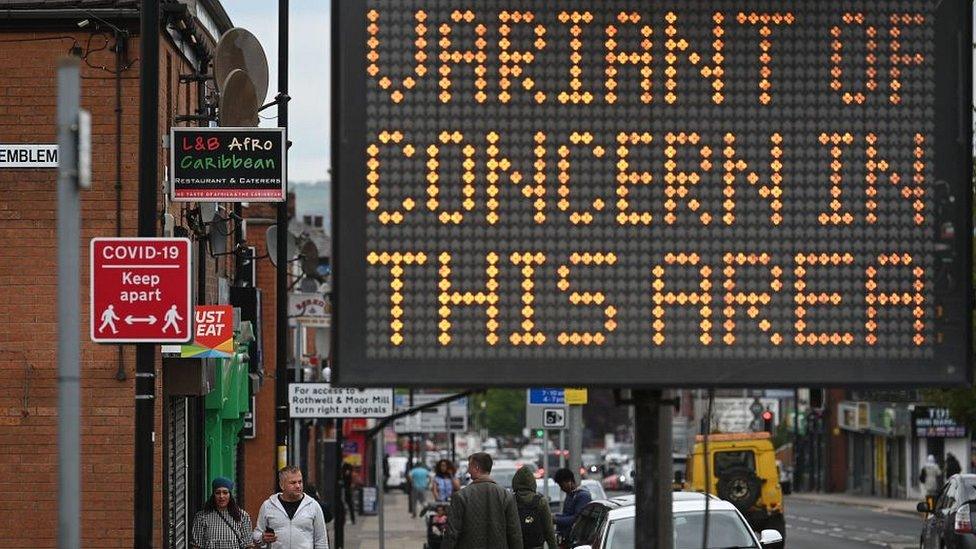Covid Indian variant: Where is it, how does it spread and is it more infectious?
- Published

The majority of new coronavirus cases in the UK are the so-called Indian variant - named the Delta variant by the World Health Organization.
This version - or mutation - was first spotted in India last October.
What is the so-called Indian variant?
Viruses mutate all the time. Most variants are insignificant, but some can make a virus more contagious.
UK scientists say the Delta variant - known as B.1.617.2 - is spreading more quickly than the Kent or Alpha variant, which was behind a surge in cases over the winter.
How many cases are there and where?
There have been almost 18,000 cases of the B.1.617.2 variant in England, just under 3,000 in Scotland, 189 in Wales and 37 in Northern Ireland.

The latest Public Health England figures up to 2 June showed the worst-hit areas were:
Bolton - 2,149 cases
Blackburn with Darwen - 724
Bedford - 608
Leicester - 349
However, just because it's the most common strain doesn't always mean there's lots of it about.
In West Lancashire and East Hertfordshire, for example, in the two weeks to 29 May the variant accounted for 100% of the cases analysed for variants. But this amounted to only nine individual infections each.
Not all cases are analysed and a higher proportion are in areas with lots of the Delta variant, potentially skewing the figures.
But random swabbing carried out by the Office for National Statistics, which is not skewed in this way, also found a growing proportion of cases looked like they were the Delta variant.
Is it easier to catch?
It does appear to spread more easily than the Kent variant (B.1.1.7).
Transmission rates for the Indian strain have been put at anywhere between 30 and 100% higher than for the Kent or Alpha variant.
Roughly 12% of contacts of people with the Indian variant went on to develop coronavirus, compared with 8% of those who had the so-called Kent variant, according to Public Health England analysis - suggesting it is roughly 50% more transmissible.
But some of that could be the behaviour of humans, rather than the virus itself.
When a variant spreads faster than others, it could be driven by the strain being more infectious, by differences in how close people get, or by different vaccination rates.
For instance, it's been pointed out some of the worst-affected areas have very low proportions of residents working from home.
Will it stop the easing of lockdown?
Despite fears over the Indian variant, most of the UK went ahead with easing restrictions on 17 May.
However, the government has issued new guidance for people in eight areas of England, external with high numbers of cases
People have been advised to minimise travelling in and out of Kirklees, Bedford, Blackburn with Darwen, Bolton, Burnley, Leicester, Hounslow and North Tyneside, external.
In addition, residents have been advised - wherever possible - to meet people outside, maintain social distancing of 2m (6ft) from people not in their household and work from home if they can.
It is not clear whether the next stage of easing in England will happen on 21 June, as was set out in the government's roadmap.
The prime minister and health secretary have indicated they will wait for another week's data before making a decision.
Will other countries stop people going on holiday because the UK has it?
Many countries already have bans on people from the UK and elsewhere entering.
France has brought a ban on non-essential travel from the UK back into force in direct response to the spread of the India variant.